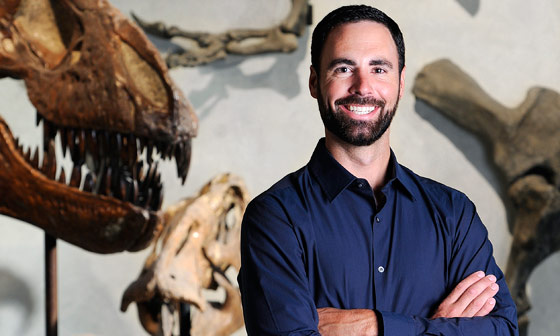|
|
|
The Rocky Mountain region's record of dinosaur evolution between 80 and 65 million years ago is unparalleled. In particular, dinosaur sites from about 75 million years ago, ranging from Alaska to Mexico, document one of the greatest explosions of dinosaur diversity in the world and offer a rare glimpse into greenhouse ecosystems completely foreign to us today. Collaborative work in Grand Staircase-Escalante National Monument of southern Utah has begun exposing one of the last great dinosaur boneyards from this amazing interval in time. New discoveries by the Denver Museum of Nature & Science promise to help reconstruct this lost age, when North America was split in two by the great Western Interior Seaway. Ten million years later, as the seaways retreated, the final dinosaur ecosystems thrived in present-day Colorado. In particular, the great extinction event marked by K/T boundary preserved at the Plains Conservations Center's West Bijou site documents these final moments 66 million years ago better than anywhere else on Earth. Understanding of the final 15 million years of dinosaur dominance on Earth is key to learning about the ecosystems of a greenhouse world and the factors that drove dinosaur diversification, evolution, and extinction. |

 Joe Sertich, PhD, is Curator of Vertebrate Paleontology at the Denver Museum of Nature & Science. Sertich grew up in the Denver area and, after attending Colorado State University, earned his doctorate from Stony Brook University in New York. He currently studies the effects of global-scale change, such as climate and shifting continents, on dinosaurs and their ecosystems. This field-based research has taken him to locales around the world, including Colorado, Utah, Kenya, Madagascar, Egypt, and Antarctica and has led to the discovery of countless new dinosaurs and other extinct animals.
Joe Sertich, PhD, is Curator of Vertebrate Paleontology at the Denver Museum of Nature & Science. Sertich grew up in the Denver area and, after attending Colorado State University, earned his doctorate from Stony Brook University in New York. He currently studies the effects of global-scale change, such as climate and shifting continents, on dinosaurs and their ecosystems. This field-based research has taken him to locales around the world, including Colorado, Utah, Kenya, Madagascar, Egypt, and Antarctica and has led to the discovery of countless new dinosaurs and other extinct animals.